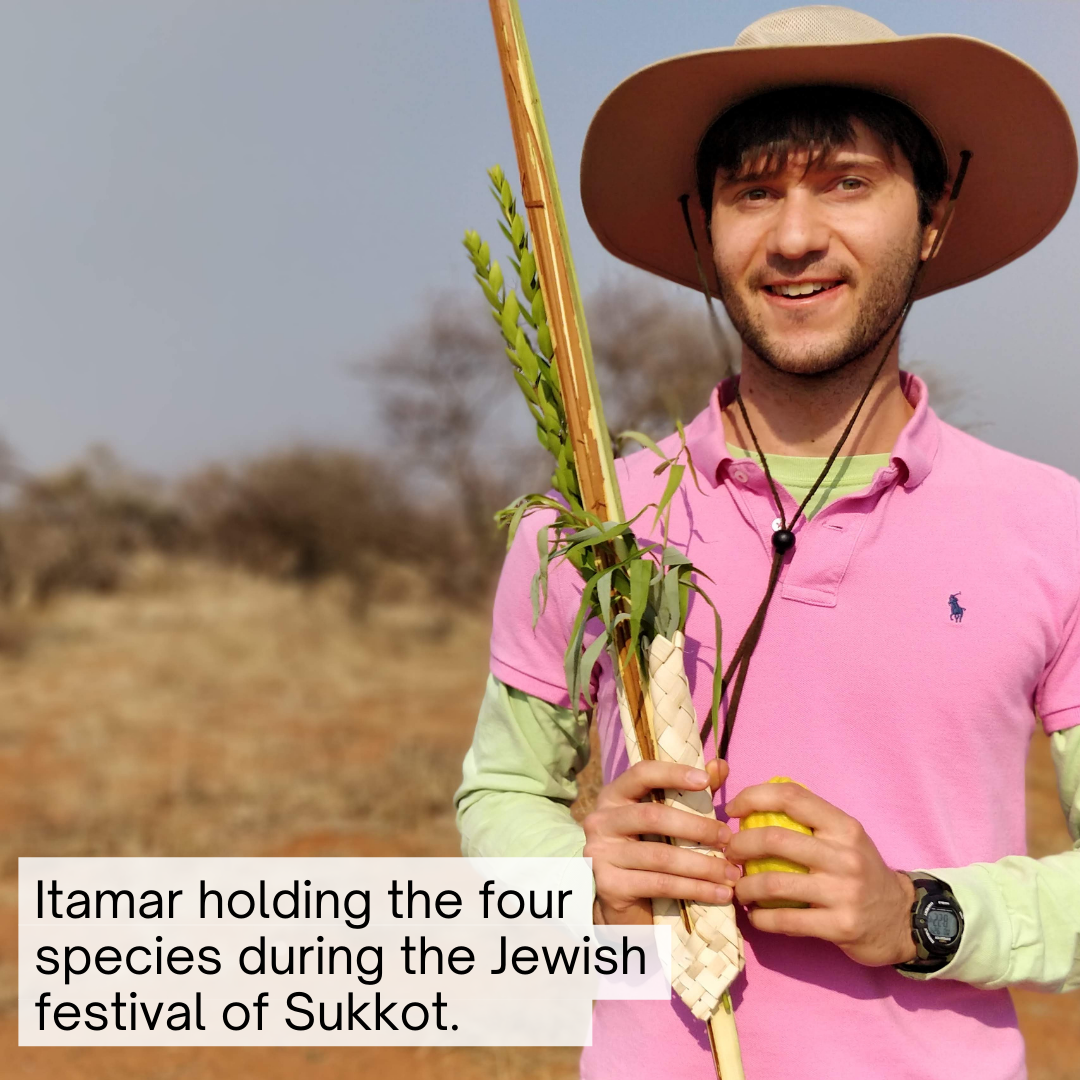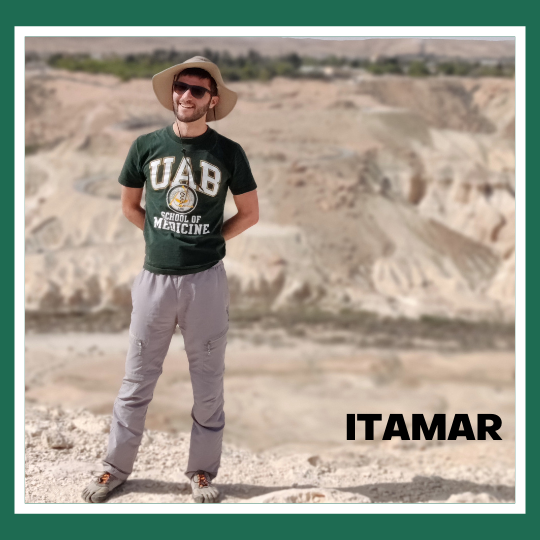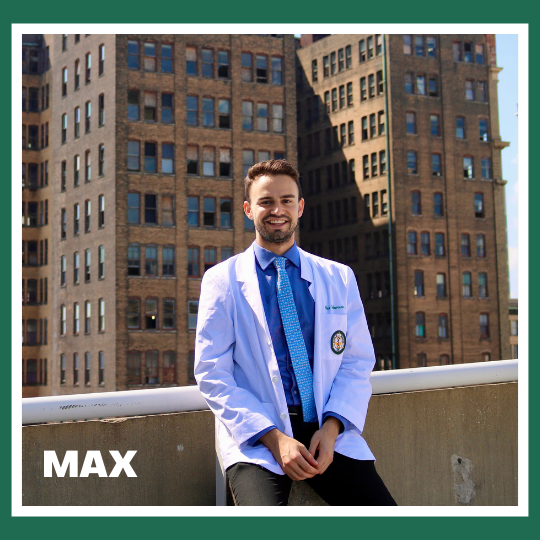 Many people have found it hard to connect with people throughout the pandemic—limiting interactions to virtual gatherings and phone calls. Now, as restrictions have lifted, two Heersink School of Medicine students want to bring their community and its allies together. This year (2021), Itamar and Max—both equipped with the desire to build a community centered around Jewish community and culture—have launched the Jewish Medical Student Association (JMSA).
Many people have found it hard to connect with people throughout the pandemic—limiting interactions to virtual gatherings and phone calls. Now, as restrictions have lifted, two Heersink School of Medicine students want to bring their community and its allies together. This year (2021), Itamar and Max—both equipped with the desire to build a community centered around Jewish community and culture—have launched the Jewish Medical Student Association (JMSA).
Meet Itamar.
 Born in Israel, Itamar Shapira (MS3, pictured on left) came to the United States with his family when he was about two years old. Having grown up in Huntsville, Alabama, there was only a small Jewish community—he could even recall being the only Jewish boy in his school. While already proud of his heritage, it wasn’t until college that he would dig deeper into the religious aspect of Judaism.
Born in Israel, Itamar Shapira (MS3, pictured on left) came to the United States with his family when he was about two years old. Having grown up in Huntsville, Alabama, there was only a small Jewish community—he could even recall being the only Jewish boy in his school. While already proud of his heritage, it wasn’t until college that he would dig deeper into the religious aspect of Judaism.
Itamar followed his academic career to Vanderbilt University, where he majored in biomedical engineering. Spiritually, Itamar’s journey led him to study at the yeshiva, also known as a seminary. Since his time at the yeshiva, Itamar said he has become more observant and traditional. As a symbol of his piety, he has chosen to wear a kippah (also sometimes called a “yarmulke”)—something only 1/3 of Jewish men choose to wear.
When speaking about his experience wearing a kippah in Alabama, Itamar admits that “It’s interesting. I am very different, yet people still recognize me. They know me, but they don’t always really know me. When they see the kippah, some think it means that I am a priest or clergy. Others may have some concept of Judaism, it may only be from the Bible, without always understanding Jewish history and culture since then.” He adds, “It’s an interesting balance of often being welcomed but not fully understood, and then trying to give people a fuller picture of what Jewish means.”
Itamar’s passion for better patient care led him to the University of Alabama at Birmingham Heersink School of Medicine, where he seeks to not only learn the tools of the trade, but make sure that Jewish students have a vibrant home at the school.
Meet Max
 Originally from the Phoenix area, Max Oscherwitz was raised in the denomination of Reform Judaism. Looking back at his childhood, Max explains, “I’ve always identified with being Jewish both inside and outside of the synagogue. From an early age, I observed various holidays and traditions with my family, had a Bar Mitzvah, attended Jewish summer camps, was a member of a Jewish youth group, and taught Hebrew to Jewish children with special needs. Additionally, I have tried to partake as much as I can in Tikkun Olam (repairing the earth), and in tzedakah (philanthropy and social justice).”
Originally from the Phoenix area, Max Oscherwitz was raised in the denomination of Reform Judaism. Looking back at his childhood, Max explains, “I’ve always identified with being Jewish both inside and outside of the synagogue. From an early age, I observed various holidays and traditions with my family, had a Bar Mitzvah, attended Jewish summer camps, was a member of a Jewish youth group, and taught Hebrew to Jewish children with special needs. Additionally, I have tried to partake as much as I can in Tikkun Olam (repairing the earth), and in tzedakah (philanthropy and social justice).”
In pursuit of his academic career, Max attended undergraduate school at the University of Arizona, where he majored in physiology and minored in psychology. Upon graduation, Max, a Fulbright Scholar, took a gap year to teach English and work with the Red Cross in Colombia, South America.
Knowing he would be traveling back-and-forth to explore potential medical schools, Max decided to narrow his search to the Southeast. With UAB’s world-renowned research programs, along with the university’s four-year MD/MBA program, it became the perfect fit for Max.
After starting medical school at UAB, Max added, “There aren’t as many Jews in the south as other geographical locations in the United States.” “Itamar and I want to create an environment that fosters relationships between Jewish medical students and with those who are interested in learning more about Judaism—both inside and outside the medical field,” he explained.
Building a Community
The organization is centered around three principles:
- Jewish community—providing Jewish medical students opportunities and spaces to practice and share their faith and culture together, each in their unique way
- Professional identity—caring for others is a perennial Jewish value, and the study of Jewish identity and faith provides an ethos for better doctoring and patient care
- Relationships—within the school, the JMSA is one of many cultural and interest groups enhancing the diversity and activity of the School of Medicine. Forming relationships and activities with others is part of the Jewish value of engaging in the society and the broader world. Beyond the walls of the School of Medicine, JMSA acts to connect Jewish students to communal and religious activity in the Birmingham Jewish community, adding to the vibrancy of both the students’ lives and the community.
As the sole currently registered Jewish organization on campus, the JMSA informally acts a nucleus for broader Jewish life. Students from multiple different schools of UAB, including undergraduates eager to be a part of the young Jewish community, have reached out and been connected to communal and social events.
Having just started at the Club Organization Fair this year (2021), the duo found a small core of medical students who joined, some of whom were active in their home Jewish communities. They have gathered, often informally, for community-based events on Shabbat (the Jewish day of rest), getting to know the broader Birmingham Jewish community.
Other members and attendees include culturally engaged non-Jewish friends and allies. Altogether, Itamar and Max are assembling a membership base who have already shared Shabbat meals together, make sure everyone has a good opportunity to celebrate the Jewish holidays both within and outside of school, and share Jewish tradition and wisdom with the broader community.
One of the most publicly recognizable Jewish holidays, Hanukkah, will begin this year on Sunday, November 28th, and end on Monday, December 6th. JMSA will celebrate at Volker Hall with a menorah lighting event, song-singing, and traditional Jewish food, such as potato pancakes called “latkes.”
When lighting the menorah, Itamar explains, “There are eight candles to light on the menorah, but technically that’s not true. There is a ninth candle that doesn’t count towards the eight. The “Shamash” (Hebrew for “servant” candle) lights the eight candles, representing the eight days of Hanukkah, and is always placed higher or lower on the menorah than the others. He explains the beautiful message, so apt for current times, saying:
“One candle can give light to many others, reminding each of us that that light, be it hope, joy, or kindness, only comes from another person, and for you to be that person whose light lets others shine bright too. Every person is a small flame, but together we make a great blaze to cast away the darkness.”
Upcoming as well, JMSA will be inviting medical students to learn more about the quest for Civil Rights in Birmingham by partnering with Temple Beth-El, a local synagogue, to attend their new audio-guided walking tour through downtown Birmingham, telling the story of the Jewish community in the context of Civil Rights Era Birmingham—how and why some either supported or stayed away from the effort, and how the Jewish community was affected by that period and its turmoil. There are also plans underway to bring a major Holocaust Medical Ethics historian virtually or in-person to speak to the broader UAB Heersink School of Medicine Community and dive into the history and ethical implications of medical involvement with the Third Reich.
Staying true to the group's purpose, Itamar and Max want to help create opportunities for Jewish medical students. Professional development can take shape through mentorship, lectures, and other knowledge-sharing activities. If you are a Jewish faculty member who would like to be more involved with the association, through mentorship or otherwise, Itamar welcomes you to reach out to him.
Allies are also welcome to reach out, and he adds that having awareness and support around Jewish holidays, culture, and practices (such as Kosher and Shabbat) is appreciated. If someone wants to learn more, they are welcome to join the group, attend events, or just reach out.